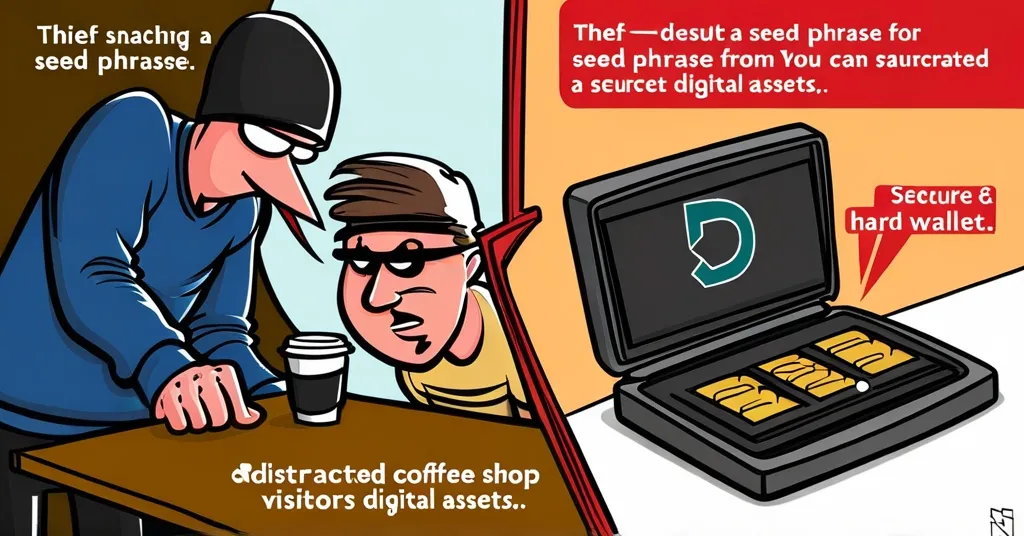Crypto Wallet Security Crisis: Seed Phrases Fail, Hardware Wallets Rise

Crypto Wallet Security Needs a Rethink
Consider this: a crypto enthusiast loses their entire savings because someone managed to snatch their seed phrase at a coffee shop. This isn’t a rare occurrence—this is the reality of the flawed security system that we’ve been relying on for too long.
- Seed phrases pose a significant vulnerability.
- Recent theft statistics highlight the risks.
- Hardware wallets offer a safer alternative.
The Dangers of Seed Phrases
Seed phrases, also known as mnemonic phrases, are a set of words used to recover your crypto wallet if you lose access. They’re supposed to be the key to your digital kingdom, but they’re more like a master key to a bank vault left wide open. Andrew Lazutkin, CTO at Tangem, calls them a “ticking time bomb,” a single point of failure that can be compromised through physical theft, surveillance, or even accidental loss.
Let’s face it, the stats don’t lie. Despite a 15% year-over-year decrease in illicit crypto activity in November, attackers still stole $324 million across 10 incidents. Phishing attacks surpassed private key theft, causing $343 million in losses in the same month. And remember the $21 million attack on DEXX in Q3 2024? It was facilitated by private key leakage, a stark reminder of the vulnerability of seed phrases.
Lazutkin warns that seed phrases hang over the crypto industry like the Sword of Damocles, posing a constant and looming threat to investors. He paints a vivid picture: “A seed phrase is like Schrödinger’s key: you’re flying blind, never truly knowing whether it’s been compromised until an attacker has already cleaned out your wallet.”
The Rise of Hardware Wallets
So, what’s the solution? Enter hardware wallets, like those developed by Tangem. These devices store your private keys offline, eliminating the need for seed phrases. Think of them as a safe deposit box for your digital assets, accessible only by you and protected from the prying eyes of hackers.
Hardware wallets come in various forms, from the popular Ledger and Trezor models to Tangem’s innovative seedless approach. They work by keeping your private keys on a secure chip within the device, never exposing them to the internet. This means that even if a hacker gains access to your computer, your crypto remains safe.
Why Hardware Wallets Are Safer
Here’s the deal: hardware wallets are safer because they never connect to the internet, eliminating the risk of remote hacking. They put you in full control of your crypto, reducing the vulnerabilities associated with seed phrases. As Lazutkin puts it, “By going seedless, you’re nipping potential risks like fraud, data breaches, or even someone physically copying your keys right in the bud.”
But let’s not get too starry-eyed. Hardware wallets aren’t without their drawbacks. They can be costly, and setting them up might be a bit more complex for some users. Still, the trade-off for enhanced security is worth considering, especially as the value of your crypto holdings grows.
The Future of Crypto Security
As we push the boundaries of decentralization and financial sovereignty, improving wallet security is crucial. Bitcoin, as the pioneer of cryptocurrencies, embodies the ethos of self-custody, and enhancing security measures like hardware wallets aligns perfectly with this mission.
Looking ahead, the future of crypto security might involve multi-signature wallets, where multiple keys are required to authorize transactions, adding an extra layer of protection. Biometric security features, like fingerprint or facial recognition, could also play a role. And let’s not forget the regulatory landscape, where discussions around crypto wallet security are ongoing, aiming to strike a balance between user protection and maintaining the decentralized nature of cryptocurrencies.
Key Questions and Takeaways
- What are the main vulnerabilities of using seed phrases for crypto wallet security?
Seed phrases are a single point of failure because they are an open format of the private key, which can be easily compromised through physical theft, surveillance, or accidental loss.
- How have recent statistics on crypto theft highlighted the risks associated with compromised private keys?
In November, despite a 15% year-over-year decrease in illicit crypto activity, attackers stole $324 million through compromised private keys, with phishing being the only attack vector causing more damage.
- What is the recommended alternative to seed phrases according to the author?
The author recommends adopting a “seedless” approach using secure cold storage solutions like non-custodial hardware wallets.
- How does the use of hardware wallets improve crypto wallet security compared to seed phrases?
Hardware wallets never connect to the internet, eliminating the risk of remote hacking, and they put users in full control of their crypto, reducing vulnerabilities associated with seed phrases.
Now is the time to evaluate your current crypto wallet setup and consider the safer alternatives available. As we continue to champion Bitcoin and the broader world of cryptocurrencies, let’s ensure our assets are protected against the ever-present threats of the digital age.



